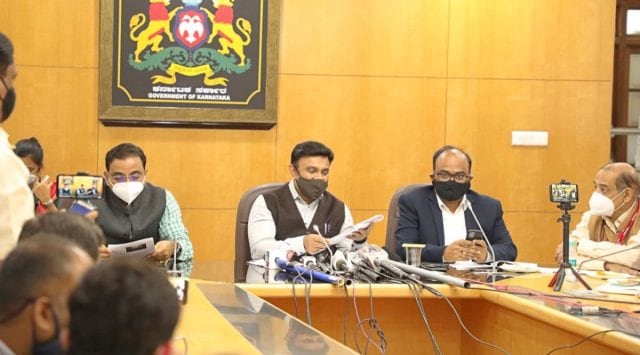- India
- International
16.4% have developed antibodies against COVID-19 in Karnataka, finds sero survey
The sero survey conducted in Karnataka also found that 40 undetected infected individuals were noted for every RT-PCR confirmed case, indicating the case-to-undetected-infections ratio (CIR) to be at 1:40 in the state.
 According to Health and Medical Education Minister K Sudhakar, the survey was conducted to estimate the prevalence of COVID-19 in the state was done from September 3 to 16.
According to Health and Medical Education Minister K Sudhakar, the survey was conducted to estimate the prevalence of COVID-19 in the state was done from September 3 to 16.A total of 27.3 per cent of Karnataka’s population was exposed to Covid-19 by mid-September, according to the findings of the sero survey conducted by the State Department of Health and Family Welfare Services. Further, the study estimates that 16.4 per cent of the 15,624 samples studied during the survey had developed antibodies against COVID-19 as of September 16.
Based on the first round of survey, the report published on Wednesday said, “Out of 7.07 crore estimated population in Karnataka, the study estimates that 1.93 crore (27.3%) of the people are either currently infected or already had the infection in the past, as of 16 September 2020,”.
According to Health and Medical Education Minister K Sudhakar, the survey was conducted to estimate the prevalence of COVID-19 in the state. While all participants of the survey were aged 18 years and above, participation was ensured from all 30 districts of the state, including all eight zones of BBMP (Bengaluru). The survey was conducted in 290 hospitals and selected population settings and was done from September 3 to September 16, Sudhakar added.
Comparatively, the overall weighted adjusted seroprevalence of IgG was 29.1 per cent in Delhi, 16 per cent in Mumbai’s non-slum settings, 57 per cent in Mumbai’s slum settings, 36.1 to 65.4 per cent across five prabhags (wards) in Pune, 7.8 per cent in Indore, 22.7 per cent in Puducherry, and 32.3 per cent in Chennai.
However, epidemiologist Dr Giridhar R Babu — who was among the team of principal investigators of the survey — told indianexpress.com that the number cannot be interpreted as “very high” when compared to other states.

“Compared to other studies in India, the survey undertaken in Karnataka has captured total prevalence, which included information on both current and past infections when the data was collected. While 16.4 per cent of the people in the surveyed population were infected in the past and found to have IgG antibodies against SARS CoV-2, another 12.7 per cent of the apparently healthy population in the surveyed area was found to have a current(active) infection then. The estimated share was ascertained using both of these mentioned,” he said.
Meanwhile, Sudhakar added that all other serosurveys conducted in other states were limited to information only within the confined limits of the metropolitan area, unlike Karnataka which studied cases from district, taluk, and rural areas.
Also, investigators involved in the study noted that they used Rapid Antigen Test (RAT) and Reverse Transcription Polymerase Chain Reaction (RT-PCR) for the diagnosis of acute infection. Serum testing for IgG antibodies was also conducted to understand the protection offered by the immune response, the team added.
Reacting to the results, Dr Ravi Kumar, Consultant – Internal Medicine, Manipal Hospitals Whitefield said turning back coronavirus seems to be possible quicker than before. “The overall adjusted prevalence of COVID-19 was 27.3% (combined IgG and active infection). More than a dozen scientists said that the threshold for herd immunity is likely to be much lower, just 50% or even less. If that’s true, then it may be possible to turn back the coronavirus more quickly than once thought,” he said.
‘Case-to-undetected-infections ratio (CIR) in Karnataka is 1:40’
The sero survey conducted in Karnataka also found that 40 undetected infected individuals were noted for every RT-PCR confirmed case, indicating the case-to-undetected-infections ratio (CIR) to be at 1:40 in the state. This is comparatively lesser than the same noted by the Indian Council of Medical Research (ICMR) in the first round of sero survey conducted in May when CIR ranged from 1:81.6 to 1:130.1. However, the second round of the ICMR survey had noted only 26 to 32 infections per case (August-September).
Incidentally, CIR higher than the state average was observed in 19 districts — Vijayapura, Belagavi, Chitradurga, Tumakuru, Raichur, Ramanagar, Haveri, Chamarajanagar, Bidar, Davanagere, Yadgir, Kalaburagi, Kolar, Kodagu, Mandya, Chikmagalur, Ballari, Bengaluru Rural, and Hassan. “These districts need to improve detection of cases actively through syndromic approach, better their testing numbers, and have to ensure other public health actions are implemented efficiently,” Dr Babu added.
On the other hand, areas that showed a low case to infection ratio included Bommanahalli, East, West, and South Zones (of BBMP in Bengaluru), and Mysuru district. “The strategy employed for testing in these places is reasonable and can be replicated in other districts,” Dr Babu suggested.
Meanwhile, the survey also found the infection fatality rate IFR) in Karnataka to be at 0.05 per cent. Sudhakar cited the IFR reported in other major cities — Mumbai (0.05-0.10%), Pune (0.08%), Delhi (0.09), and Chennai (0.13)% to claim the same was lesser in the state.
“In summary, the state is passing through different stages of the COVID-19 pandemic in different districts. The surge in cases is yet to occur in the districts like Dharwad, Gadag, Chikkaballapur, Bagalkot, and Mahadevapura Zone in Bengaluru, with the lowest estimated prevalence of COVID-19,” he added.
Further, a senior official of the Technical Advisory Committee said that the next round of serosurvey which is likely to take place in December would witness better results. “For instance, the total number of active cases as on September 16 was 1.01 lakh when the same as on November 3 has reduced to around 40,000 now. The follow-up survey will help us determine the extent and speed of transmission and to evaluate the impact of containment strategies over time in the state,” the official said.
Clarifying how the strategy will be improvised in the state to combat the pandemic, Sudhakar concluded by citing the recommendation put forth by the investigators which called for an “informed local decision-making at the district level” to mount the necessary public health response towards the pandemic across the state.
While the survey results were planned to be presented on October 24, the press conference called for the same was cancelled without any explanation, after which it was announced in Bengaluru on Wednesday.
Apr 19: Latest News
- 01
- 02
- 03
- 04
- 05






































